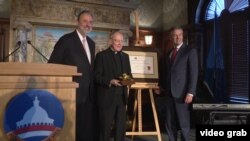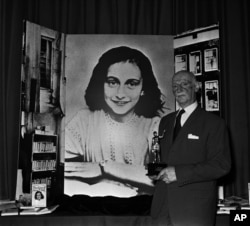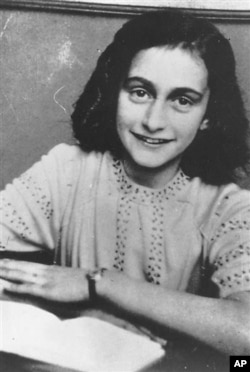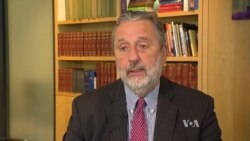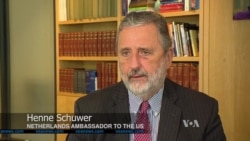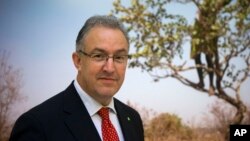As wars and rumors of war haunt halls of states, large numbers of people are fleeing their native lands to nations that are more prosperous and better governed.
Meanwhile, each destination country is faced with the challenges an influx of migrants and refugees brings. The fact that a few of them might carry out terrorist attacks adds a disquieting element to the already anxious mix.
Against this backdrop, a recent conversation with Netherlands’ ambassador to the United States was markedly level-headed.
Anne Frank ‘symbolic for us’
Henne Schuwer, a career diplomat from the Kingdom of the Netherlands, was getting ready to present the Anne Frank Award to two U.S.-based global organizations whose missions are to alleviate the sufferings of refugees and help scholars threatened with persecution.
“Anne Frank was a refugee, let’s start with that,” said Schuwer, as he began a conversation.
Frank, a German-born Jewish girl who, along with her family, moved to the Netherlands when the Nazis gained control of Germany, later went into hiding when Germans invaded the Netherlands. She and her family survived in hiding for more than two years, thanks to help from non-Jewish Dutch citizens before they were discovered and sent to concentration camps, where she died.
The diary she kept while in hiding would emerge, posthumously, as one of the most important testimonials of the brutality of World War II.
Anne Frank: The Diary of a Young Girl is a very moving account, the Dutch diplomat says, especially “because you know how it ends, what really became of her; if you read the book with that knowledge, it can be very, very emotional.”
The Netherlands Embassy initiated the Anne Frank award in 2014. This year, the honorees were the Jesuit Refugee Service and New York-based Scholars at Risk, recognized for their “activism, for not walking away from problems of the world.”
The Anne Frank award is “symbolic for us,” and stands for “the effort we as a country put in to defend human rights,” Schuwer says.
That effort — and the spirit behind the effort — remain strong today, he adds.
WATCH: Interview with Dutch Ambassador Henne Schuwer
‘We’re used to immigration’
“We are a very densely populated country, with more than 17 million people, in an area as big as Maryland, but we are very aware that we have built our society, from the 15th and 16th centuries onwards, as a welcoming, tolerant society” that has “prospered and profited from welcoming people with different skills and different ideas,” Schuwer says.
The ambassador acknowledges that taking in large groups of refugees fleeing wars poses a different set of challenges than does playing host to philosophers in the ranks of John Locke and René Descartes in the 17th century fleeing from England and France.
“We’re used to immigration, though I would not conceal that what’s happening at the moment, especially in Europe, is a lot of immigration, a lot of people who want to come in, and we have difficulties now in integrating them," he says.
Social contract: a two-way street
One gets the sense, in the course of the interview, that to integrate or not is a question of “to be or not to be” magnitude. Further, to ensure or at least enable the “to be,” both the receiving country’s government and society and aspiring new citizens will have to commit to a binding and ultimately mutually beneficial “social contract.”
On the one hand, giving migrant and refugee children a fair chance at education and subsequently employment and advancement opportunities to fulfill their ambitions is key to gaining productive citizens versus a migrant population that remains on the fringe of society harboring resentment. On the other hand, the responsibility of integrating into the “brave new world” also lies on the shoulders of the migrants themselves.
“It’s wonderful that you come, it’s wonderful that we can welcome you, but in the end if you come to the Netherlands and you want to live here, you have to integrate in Dutch society, including language and customs … you have to contribute to what we try to achieve,” Schuwer says.
He would, however, cut aspiring immigrant citizens some slack with regard to Dutch language skills: “You can hardly force everybody to talk perfect Dutch because the language, especially pronunciation, is quite difficult!”
When it is brought to his attention that the queen, an Argentine native, has managed to master her adopted country’s native tongue, the ambassador jokingly responded that the queen was bestowed with unique incentives.
Perfect Dutch accent aside, the ambassador held his ground concerning culture and customs: “Our customs are our customs.” Just as importantly, old and newcomers alike are obligated to abide by “rules of the land.”
WATCH: Dutch Ambassador Henne Schuwer
Resources directed toward integration
The fact that many of the terrorist attacks in the past few years in Europe have been homegrown worries Schuwer.
“Luckily we haven’t had major terrorist attacks in the Netherlands,” he said, quickly adding: “Knock on wood — as I’m saying it, I realize that maybe I shouldn’t be saying it, as I wouldn’t want to jinx it!”
The Dutch government, Schuwer said, puts an enormous amount of resources toward helping newly arrived immigrants to integrate, including making sure of a strong, grassroots-level neighborhood police presence.
“Lots of our policemen are on bikes and they walk through neighborhoods,” he said. These policemen, he said, “know their neighbors and neighborhoods” and are ready to engage. “If you have a problem, I’m your neighborhood policeman and more than that, I can also be your counselor, I can show you the way, and so on.”
Integration, ultimately, isn’t a label federal or national governments can simply declare; instead, it’s a process that can only be achieved at the grassroots level, the diplomat said.
Citizen like any other
“If we acknowledge your refugee status, we’ll provide you housing in the beginning, you have to work. At a certain moment, you go out of refugee status, you go out of government-supported housing, you pay for your own room, and you’ll be a citizen like any other, Dutch citizen,” Schuwer said, summarizing his country's approach toward refugees.
A citizen “like any other” may be the epitome of humanitarian welcome that a democratic society can extend to individuals fleeing from wars and some other situation. Yet for those in the process, it might seem elusive, if not impossible. Ambassador Schuwer points to the example of Ahmed Aboutaleb to illustrate that it is possible, and then some.
Role model
“We now have a Moroccan mayor of Rotterdam, who’s wildly popular, and in his second term,” he said. “He’s the classic example of somebody who came at a young age with his parents to the Netherlands … as you say in America, he made it!”
Ahmed Aboutaleb, born in 1961, arrived in the Netherlands at age 15 for family reunification, he holds dual Dutch and Moroccan citizenship. His official biography says that, “obtaining Dutch citizenship entails a responsibility to respect and uphold those values [enshrined in the Dutch Constitution] and to take part in building the We Society.”
The mayor is equally proud of his Arab heritage and has translated works of the Syrian-born poet Ali Ahmad Said Esber, known by the pen name Adonis or Adunis, into Dutch.
As Ambassador Schuwer spoke about the mayor of Rotterdam, he seemed not only proud of the mayor’s individual achievement, but also proud of what the Dutch society has been able to accomplish, looking toward the future with hope rather than fear.




